Top Rankings
Clarkton C-4 School District ranks among the top 20% of public school district in Missouri for:
Category
Attribute
Diversity
Most diverse schools (Top 1%)
For the 2025 school year, there is 1 public preschool serving 156 students in Clarkton C-4 School District. This district's average pre testing ranking is 1/10, which is in the bottom 50% of public pre schools in Missouri.
Public Preschool in Clarkton C-4 School District have an average math proficiency score of 8% (versus the Missouri public pre school average of 33%), and reading proficiency score of 8% (versus the 37% statewide average).
Minority enrollment is 35% of the student body (majority Hispanic), which is less than the Missouri public preschool average of 36% (majority Black).
Overview
This School District
This State (MO)
# Schools
2 Schools
733 Schools
# Students
295 Students
201,896 Students
# Teachers
27 Teachers
18,018 Teachers
Student : Teacher Ratio
11:1
11:1
District Rank
Clarkton C-4 School District, which is ranked within the bottom 50% of all 553 school districts in Missouri (based off of combined math and reading proficiency testing data) for the 2021-2022 school year.
The school district's graduation rate of 80% has stayed relatively flat over five school years.
Overall District Rank
#542 out of 557 school districts
(Bottom 50%)
(Bottom 50%)
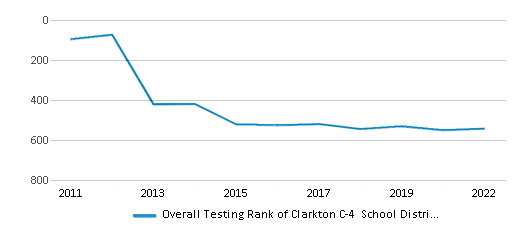
Math Test Scores (% Proficient)
10-14%
39%
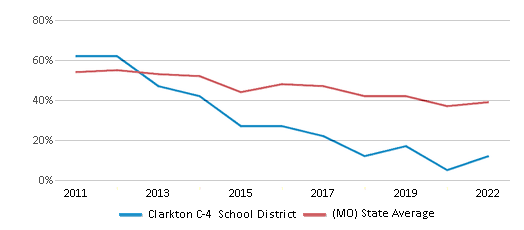
Reading/Language Arts Test Scores (% Proficient)
10-14%
43%
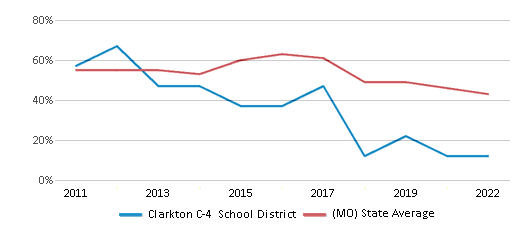
Science Test Scores (% Proficient)
6-9%
38%
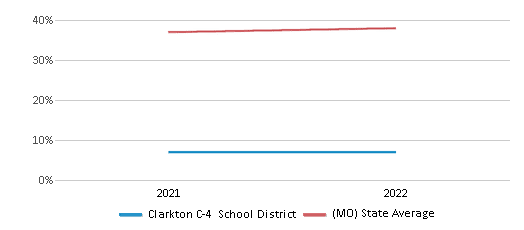
Graduation Rate
≥80%
90%
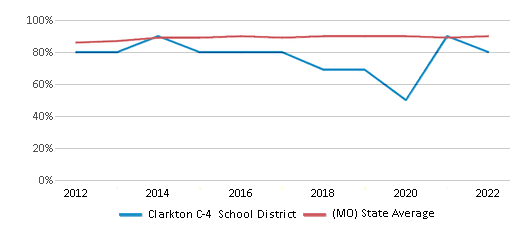
Students by Ethnicity:
Diversity Score
0.52
0.54
# American Indian Students
n/a
716 Students
% American Indian Students
n/a
n/a
# Asian Students
n/a
3,353 Students
% Asian Students
n/a
2%
# Hispanic Students
69 Students
17,293 Students
% Hispanic Students
23%
9%
# Black Students
24 Students
39,639 Students
% Black Students
8%
20%
# White Students
191 Students
129,832 Students
% White Students
65%
64%
# Hawaiian Students
n/a
837 Students
% Hawaiian Students
n/a
n/a
# Two or more races Students
11 Students
10,226 Students
% of Two or more races Students
4%
5%
Students by Grade:
# Students in PK Grade:
15
35,559
# Students in K Grade:
18
31,533
# Students in 1st Grade:
18
29,607
# Students in 2nd Grade:
18
29,116
# Students in 3rd Grade:
23
23,532
# Students in 4th Grade:
16
22,982
# Students in 5th Grade:
23
19,323
# Students in 6th Grade:
25
6,065
# Students in 7th Grade:
27
1,923
# Students in 8th Grade:
25
1,863
# Students in 9th Grade:
21
85
# Students in 10th Grade:
22
51
# Students in 11th Grade:
25
37
# Students in 12th Grade:
19
220
# Ungraded Students:
-
-
District Revenue and Spending
The revenue/student of $14,095 in this school district is less than the state median of $15,081. The school district revenue/student has grown by 14% over four school years.
The school district's spending/student of $13,285 is less than the state median of $13,908. The school district spending/student has grown by 14% over four school years.
Total Revenue
$4 MM
$13,447 MM
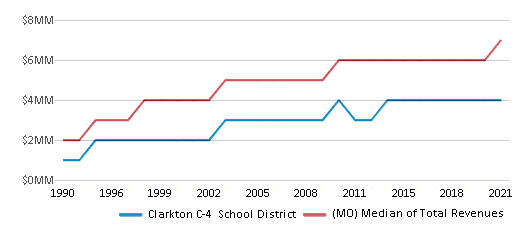
Spending
$4 MM
$12,401 MM
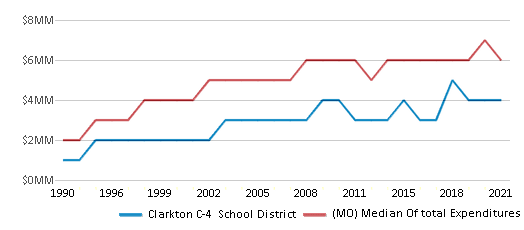
Revenue / Student
$14,095
$15,081
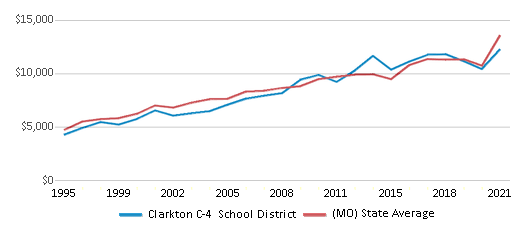
Spending / Student
$13,285
$13,908
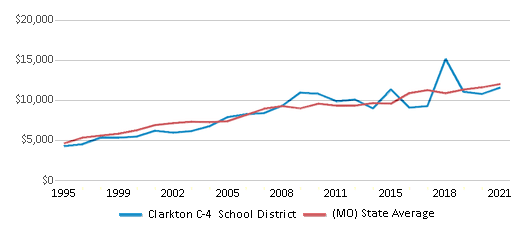
Best Clarkton C-4 School District Public Preschools (2025)
School
(Math and Reading Proficiency)
(Math and Reading Proficiency)
Location
Grades
Students
Rank: #11.
Clarkton Elementary School
(Math: 6-9% | Reading: 6-9%)
Rank:
Rank:
1/
Bottom 50%10
Hwy 162
Clarkton, MO 63837
(573) 448-3712
Clarkton, MO 63837
(573) 448-3712
Grades: PK-6
| 156 students
Recent Articles

What Is A Charter School?
Explore the world of charter schools in this comprehensive guide. Learn about their history, how they operate, and the pros and cons of this educational innovation. Discover key facts about charter schools, including admission policies, demographics, and funding, as well as what to look for when considering a charter school for your child.

10 Reasons Why High School Sports Benefit Students
Discover the 10 compelling reasons why high school sports are beneficial for students. This comprehensive article explores how athletics enhance academic performance, foster personal growth, and develop crucial life skills. From improved fitness and time management to leadership development and community representation, learn why participating in high school sports can be a game-changer for students' overall success and well-being.

February 05, 2025
Understanding the U.S. Department of Education: Structure, Impact, and EvolutionWe explore how the Department of Education shapes American education, from its cabinet-level leadership to its impact on millions of students, written for general audiences seeking clarity on this vital institution.





